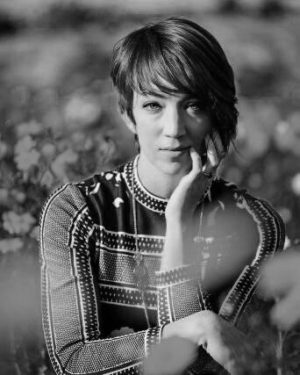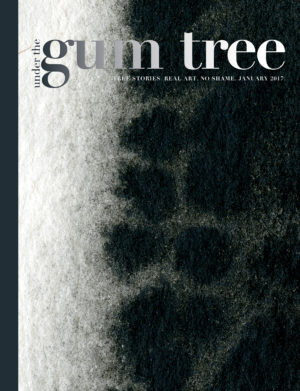Tiffany Michelle Brown

Tiffany Michelle Brown is a writer, Akido practitioner, archer, and whisky enthusiast who ran away from the deserts of Phoenix, Arizona, to live near the beaches of San Diego, California. Her fiction has been featured in Penduline, Black Denim Lit, Shooter, and Romance Magazine. Follow her adventures at tiffanymichellebrown.wordpress.com.
When and why did you start writing? What inspires your writing most now?
I’ve been reading and writing for as long as I can remember. My parents were diligent bedtime storytellers, and they claim I started reading on my own at age three. And then it wasn’t long before I started writing my own stories. I recently found a handmade “book” I wrote (and illustrated and bound) when I was a kid titled “Nate the Great and the Case of the Missing Necklace.” It’s hilarious and very obviously a byproduct of my Encyclopedia Brown phase!
Now, just about anything can serve as writing inspiration: a song I hear on the radio, the book I’m reading, a snippet of conversation, a dream. I really like writing prompts. I also like researching themed anthologies that are actively seeking stories. I see it as kind of a challenge, to create something that fits a certain theme or idea. It’s really gratifying to see a glimmer of inspiration turn into a something much larger and more complex.
Why are you drawn to nonfiction? Are there things you can better express in creative nonfiction than other genres of writing?
Nonfiction is visceral. It’s honest. When done well, it taps into the human experience in a way that’s truly powerful. Sure, all writers imbue their fiction work with pieces of themselves. It’s there, but it’s usually surrounded by made up characters or protective armor (perhaps metaphorical, perhaps literal). With nonfiction, you can’t lie, not if you want it to be good. To put it bluntly, you have to tap into some shit. And I really admire the people who are able to write nonfiction consistently, because they are consistently giving of themselves, which can be exhausting.
What events do you think warrant a story or should be written about?
Absolutely anything and everything! The beautiful thing about writing is that there will always be an audience. Even if you think your concept or idea is really strange or too personal or too mundane or silly, you’ll always find someone who wants to read about it. More specifically, I’m a big believer in writing about the things that scare you. Can you say free therapy?
As a teenager, did you find that your self-image was first constructed by what others told you was beautiful?
Oh my goodness, yes. At that age, we’re so fragile, and validation is everything. I was one of those girls who was sweet sixteen and never been kissed. I didn’t date. I thought my intelligence and my dance ability were the most beautiful things about me, because that’s what I was always complimented on. There were so many diet fads swimming around when I was a teenager, too – Weight Watchers, South Beach, lots of detoxes. There was very little around that said to me, “Hey, you’re great, just the way you are.” (Bruno Mars, where were you when I needed you?) So, I started to think I wasn’t okay the way I was. I wasn’t dating because, well, I wasn’t attractive. And then, as we see early on in “Shapeless,” the moment I received a compliment, I latched onto it like a bloodthirsty leech. I was so starved for validation, I took a single compliment to a very dangerous place.
In the beginning, you describe your body clinically, and then toward the end, more lovingly. Is this an intentional way to draw the reader in to how thoroughly you disliked your body?
Absolutely. When you dislike things, you talk about them with clipped, sharp words. You don’t add beauty to the language. The language in the beginning of “Shapeless” mirrors my mental state, too. When I threw myself headlong into anorexia, I was matter of fact about it, clinical, relentless. When you’re doing horrible things to yourself, it’s easier to be overly logical and conveniently detached.
As “Shapeless” progresses, and as I got older, I let more emotion in. I started to recognize the correlation between how I treated myself and the things that happened to me as a result. I began to work with my body instead of against it. I stopped trying to bend it to my will and listened. It’s strange to say, but as a retired dancer, I feel more connected to my body now than ever before. Yes, dancing gave me body awareness, but building a relationship with my body gave me body love.
Upon returning from Paris, you have a healthier relationship with food and your memories reflect this. Was this, coupled with nutrition courses, what set you toward learning balance with food?
Paris was eye-opening on a number of levels. Culturally, they are so ahead of the U.S. in terms of their approach to food and general fitness. Yes, French food can be fatty and rich, and I’ve been at a few dinners that lasted hours and hours. But the French savor their food. They take pride in preparing it. They’re all about fresh ingredients and food free of preservatives. They’re active on a more consistent basis than Americans; where we go to the gym in quick spurts, they walk everywhere and movement is a daily part of life. I’m sure I’m romanticizing it a lot, but that trip really showed me what a relationship with food could be. Nutrition courses were invaluable as well. I needed a dose of science, of reality, to truly understand what I’d been doing to myself. Was I my healthiest, physically and emotionally, in college? No. But I definitely started to heal at that time, thanks to education and a break from American culture.
Has dance been both enemy and savior?
Ouch. Yes. On one hand, dance has been one of the most freeing, beautiful, healthy things in my life. There are certain things I can only express through dance, and you build so much emotional intelligence through tapping into that. There’s something amazing about giving absolutely everything you are – breath, sinew, bone, muscle, emotion, brain – to a dance floor. Without a word, you can tell a whole story, and your audience is along for the ride. And honestly, it takes guts and self confidence to get up on a stage. Dance makes you brave. It takes a ton of dedication. There are so many things I Iearned from dance that I apply to non dance-related things in my life.
Unfortunately, dance is also part of the dreaded entertainment industry, which can be such a dark place. If you want to go pro, which I did, you skin has to be both flawless and thick. When you have that first encounter with the real world and you discover that for that casting director, your aesthetic is more important than your ability, well, yeah, that’s going to do a number on some people. Luckily, I’ve seen a lot of progress in the dance world. I’m not saying we’ve transcended the superficial nature of the business, but I do see more and more dancers of every shape and size out there. And that makes me so happy, because it’s positively influencing how others see themselves. If I’d seen more of that when I was younger, I wonder if “Shapeless” would’ve been a different story.

